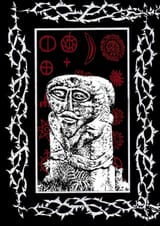Search Results
7/1/2025, 7:44:58 AM
>>509192301
>The fifth Milesian king in succession from Eremon was Tighearnmas (whose name means 'lord' or 'noble') who, we are told, was responsible for introducing the worship of Crom Cruaich on Magh Slecht. He was also responsible, according to legend, for the first gold mining in Ireland - the very metal that the stone idol of Crom was encased in. Tighearnmas is said to have perished along with three quarters of his people while worshipping this idol at Samhain: To him noble Gaels would prostrate themselves... they beat their palms, they pounded their bodies wailing to the demon who enslaved them they shed falling showers of tears... ! This all sounds rather exaggerated for effect. We are not told how this 'demon' enslaved them, or why these worshippers should undergo such violent acts of self mutilation
>What we are told is that it was the 'noble' Gaels that worshipped here, in other words, those with free status, those who held the Nemed under Brehon law, those upper echelons of society who were admitted to the public ceremonies held by the druids. These were no mere peasant farmers, but noblemen and women, and kings along with them. Crom certainly had quite an aristocratic following!
>God of Agriculture and Fertility
>We are also told, in another part of the poem, the reasons for the prostration, and the offering of the first born as tribute:
>Milk and corn
>They would ask from him speedily
>in return for one third of their healthy issue
>great was the horror and the scare of him
>The Nemedians were forced to offer such a tribute to the Fomorians, and so too were the De Dananns. This would suggest that the Fomorian gods were gods of fertility and of agriculture, to whom appeasement had to be made so that they would continue to provide the sustenance of the harvest. Popular folk belief still retains the idea of leaving offerings out to the daoine maith, the good folk or sidhe, to prevent them stealing the goodness of the milk
>The fifth Milesian king in succession from Eremon was Tighearnmas (whose name means 'lord' or 'noble') who, we are told, was responsible for introducing the worship of Crom Cruaich on Magh Slecht. He was also responsible, according to legend, for the first gold mining in Ireland - the very metal that the stone idol of Crom was encased in. Tighearnmas is said to have perished along with three quarters of his people while worshipping this idol at Samhain: To him noble Gaels would prostrate themselves... they beat their palms, they pounded their bodies wailing to the demon who enslaved them they shed falling showers of tears... ! This all sounds rather exaggerated for effect. We are not told how this 'demon' enslaved them, or why these worshippers should undergo such violent acts of self mutilation
>What we are told is that it was the 'noble' Gaels that worshipped here, in other words, those with free status, those who held the Nemed under Brehon law, those upper echelons of society who were admitted to the public ceremonies held by the druids. These were no mere peasant farmers, but noblemen and women, and kings along with them. Crom certainly had quite an aristocratic following!
>God of Agriculture and Fertility
>We are also told, in another part of the poem, the reasons for the prostration, and the offering of the first born as tribute:
>Milk and corn
>They would ask from him speedily
>in return for one third of their healthy issue
>great was the horror and the scare of him
>The Nemedians were forced to offer such a tribute to the Fomorians, and so too were the De Dananns. This would suggest that the Fomorian gods were gods of fertility and of agriculture, to whom appeasement had to be made so that they would continue to provide the sustenance of the harvest. Popular folk belief still retains the idea of leaving offerings out to the daoine maith, the good folk or sidhe, to prevent them stealing the goodness of the milk
Page 1
